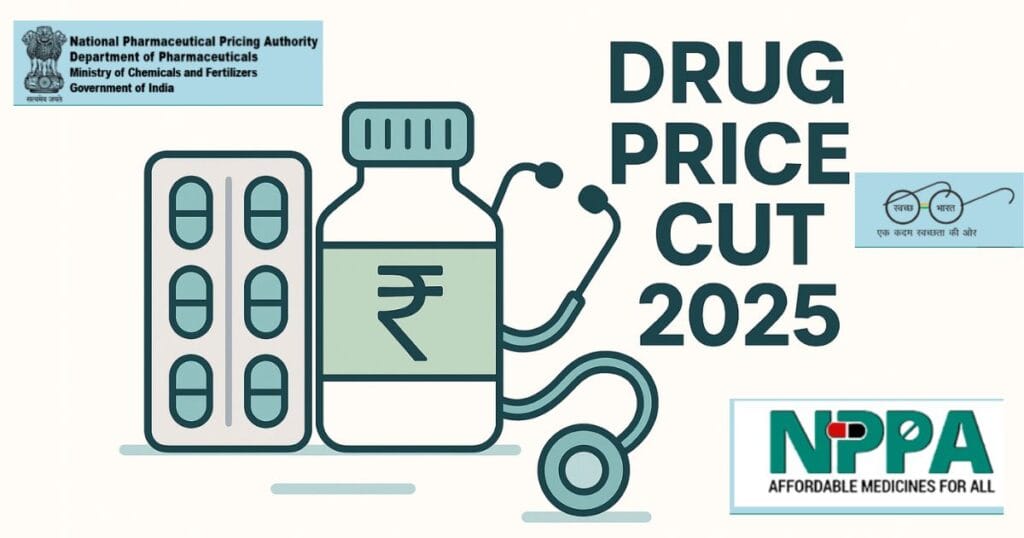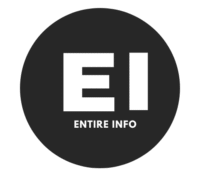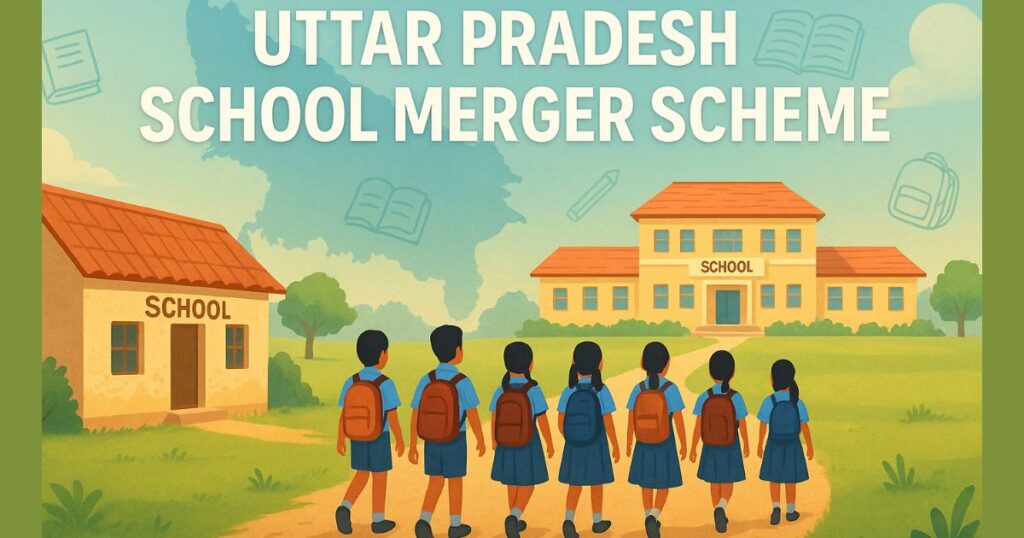On August 1, 2025, the National Pharmaceutical Pricing Authority (NPPA) issued a major order to control drug prices in India. This order sets prices for 37 essential drugs and 4 emergency drugs, making them more affordable for everyone. This step is crucial because many people in India struggle to buy expensive medicines. With this rule, essential medicines will become cheaper, especially for those dealing with conditions like asthma, heart disease, or diabetes. It’s a big move to make healthcare more accessible.

This order has reduced prices for over 900 essential drugs and 3200 new drugs by an average of 17%, saving patients around ₹3788 crore every year. Strict rules have also been put in place to ensure no pharmacy or company charges more than the set prices.
What is NPPA?
The National Pharmaceutical Pricing Authority (NPPA) is a government body that keeps an eye on drug prices to make sure essential medicines are affordable. Set up in 1997, its main job is to ensure people can buy life-saving drugs without breaking the bank. The NPPA works under the Drugs Price Control Order (DPCO) 2013, a law backed by the Essential Commodities Act 1955. It sets maximum prices for essential drugs and limits price increases for other drugs to 10% per year. If a company breaks the rules, the NPPA can fine them or even blacklist them.
Check NPPA official Website
Brief History and Powers
The NPPA was created to tackle the problem of expensive medicines that many couldn’t afford. The DPCO law, first introduced in 1970 and updated in 2013, gives NPPA the power to fix prices for essential drugs, recover overcharged amounts, and punish companies that don’t follow rules. This ensures affordable medicines for all.
Which Drugs Are Included?
The NPPA’s new rule covers 37 drug formulations and 4 emergency drugs, along with 928 essential drugs listed in the National List of Essential Medicines (NLEM). Below is a table with some key drugs, their uses, new prices, and quantities. These prices, which include GST, will apply from April 1, 2025.
| Drug Name | Use | New Drug Prices (₹) | Quantity |
|---|---|---|---|
| Ipratropium | Asthma/Lung diseases | 8.50 | 1 Inhaler (200 MDI) |
| Sodium Nitroprusside | High blood pressure (emergency) | 65.43 | 1 Vial (50 mg) |
| Diltiazem | Heart rhythm issues | 5.54 | 1 Tablet (90 mg) |
| Povidone Iodine | Wound cleaning/antiseptic | 1.06 | 1 Gram (0.1% cream) |
| Amoxicillin | Bacterial infections | 7.49 | 1 Capsule (500 mg) |
| Atorvastatin | Cholesterol control | 19.64 | 1 Tablet (40 mg) |
| Metformin | Diabetes control | 2.83 | 1 Tablet (500 mg) |
| Paracetamol | Pain/fever relief | 1.19 | 1 Tablet (500 mg) |
This table shows a part of the 743 drug formulations whose prices have been fixed by NPPA, including antibiotics, heart medicines, and painkillers.
Details on Key Drugs
Ipratropium
This drug helps people with asthma or lung diseases (COPD) by opening airways to make breathing easier. Its new price of ₹8.50 per inhaler (200 MDI) makes it more affordable for patients needing long-term treatment.
Sodium Nitroprusside
Used in hospitals for emergencies like severe high blood pressure or heart failure, this drug now costs ₹65.43 per 50 mg vial. This lower price ensures better access to critical care.
Diltiazem
This medicine treats heart rhythm problems and chest pain (angina). Priced at ₹5.54 per 90 mg tablet, it helps heart patients stick to their treatment without worrying about costs.
Povidone Iodine
An antiseptic used to clean wounds and prevent infections, it now costs ₹1.06 per gram (0.1% cream). This makes it affordable for both home and hospital use.
Which Types of Drug Prices Got Cheaper?
The NPPA’s rule has lowered prices for many types of medicines, including:
- Antibiotics: Amoxicillin, Azithromycin, and Cefixime for infections like throat or urinary tract issues.
- Heart Medicines: Amlodipine, Atorvastatin, and Clopidogrel for blood pressure and cholesterol control.
- Painkillers: Paracetamol, Diclofenac, and Ibuprofen for pain and fever relief.
- Diabetes Drugs: Metformin and Insulin for sugar control.
- Cancer Drugs: Capecitabine and Carboplatin for cancer treatment.
These cheaper drugs will help people with long-term illnesses like diabetes, heart disease, or infections. For example, Metformin now costs ₹2.83 per tablet, and Paracetamol is ₹1.19 per tablet.
How and When Will the Rule Apply?
The new prices will start from April 1, 2025, though some drugs have until December 2025 to comply. Drug companies must update their prices within 15 days and inform NPPA. If a drug’s current price is lower than the new ceiling price, companies can increase it slightly, but only by 1.74%, based on the 2024 Wholesale Price Index (WPI). Pharmacies and distributors must show the new prices and avoid overcharging. Breaking the rules will lead to penalties.
Impact on Drug Companies and the Market
This rule may reduce profits for drug companies, especially smaller ones. Big companies like Sun Pharma or Cipla might need to change their pricing plans. Some companies could produce fewer drugs to save costs, which might cause shortages. The NPPA has already blacklisted companies like ANG Lifescience for breaking rules, showing they’re serious about enforcement. Smaller companies might find it tough to afford compliance costs, which could shake up the market.
How Will This Affect Patients and the Public?
Patients will save around ₹3788 crore yearly due to the 17% price cut. This is great news for those with long-term illnesses. However, if companies make fewer drugs due to lower profits, some areas might face shortages. The quality of drugs won’t change, as NPPA and other agencies keep a close watch. Patients should check bills to ensure they’re not overcharged and report any issues.
Rules and Penalties for Pharmacies and Dealers
Pharmacies must show the ceiling prices on drug packaging and bills. Charging more than the set price can lead to fines, recovery of extra money, or even blacklisting under the DPCO and Essential Commodities Act. By March 2025, NPPA noted 307 violations, showing they’re cracking down hard. Pharmacies must update prices by April 1, 2025, to avoid trouble.
How Can People Check Drug Prices?
People can verify ceiling prices on the NPPA’s website (nppa.gov.in) or ask at pharmacies. To report overcharging on Drug Prices:
- Check the ceiling price on the NPPA website or drug packaging.
- Compare it with the bill (includes GST).
- Call NPPA’s helpline (1800111255) or email (npf@nppaindia.nic.in) to complain.
- Use NPPA’s online complaint portal for quick action.
This simple process helps people avoid being overcharged.
Also Read- How BHASKAR is Connecting 1.97 Lakh+ Startups Across India
Will doctors prescribe different drugs now?
No, doctors will continue prescribing the same drugs. This rule only controls prices, not usage.
Will generic drugs be affected?
Yes, generic drugs in the NLEM list will also become cheaper.
Is GST charged separately?
No, the ceiling prices include GST. Pharmacies can’t add extra taxes.
Will all drugs get cheaper?
Only essential drugs in the NLEM have fixed prices. Other drugs can increase by up to 10% yearly.
A Real-Life Example: How Much Can Patients Save?
Imagine a diabetes patient taking a Metformin (500 mg) tablet daily. Before, it cost ₹3.50 per tablet, totaling ₹1277 for 365 tablets a year. Now, at ₹2.83 per tablet, the yearly cost is ₹1032, saving ₹245 (19%). This shows how cheaper drugs can ease the burden for people with long-term illnesses.
Is This Rule Enough? (Analysis)
This rule is a big step toward making medicines affordable, but there are challenges. The NLEM only covers 388 drugs, while thousands are sold in the market. Non-essential drugs can still get pricier. If companies cut production, shortages could happen. NPPA needs to keep a close watch on the supply chain and punish rule-breakers. In the future, expanding the NLEM list and real-time price monitoring could help even more.
Conclusion
The NPPA’s new rule is great news for millions, making essential drugs cheaper and saving money. But its success depends on ensuring drugs are available and pharmacies follow the rules. Stay informed—check prices, report overcharging, and share your thoughts in the comments. Bookmark the site for the latest updates!


